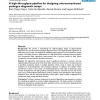Free Online Productivity Tools
i2Speak
i2Symbol
i2OCR
iTex2Img
iWeb2Print
iWeb2Shot
i2Type
iPdf2Split
iPdf2Merge
i2Bopomofo
i2Arabic
i2Style
i2Image
i2PDF
iLatex2Rtf
Sci2ools
112
click to vote
BMCBI
2008
2008
A high-throughput pipeline for designing microarray-based pathogen diagnostic assays
Background: We present a methodology for high-throughput design of oligonucleotide fingerprints for microarray-based pathogen diagnostic assays. The oligonucleotide fingerprints, or DNA microarray probes, are designed for identifying target organisms in environmental or clinical samples. The design process is implemented in a high-performance computing software pipeline that incorporates major algorithmic improvements over a previous version to both reduce computation time and improve specificity assessment. Results: The algorithmic improvements result in significant reduction in runtimes, with the updated pipeline being nearly up to five-times faster than the previous version. The improvements in specificity assessment, based on multiple specificity criteria, result in robust and consistent evaluation of cross-hybridization with nontarget sequences. In addition, the multiple criteria provide finer control on the number of resulting fingerprints, which helps in obtaining a larger numb...
| Added | 09 Dec 2010 |
| Updated | 09 Dec 2010 |
| Type | Journal |
| Year | 2008 |
| Where | BMCBI |
| Authors | Ravi Vijaya Satya, Nela Zavaljevski, Kamal Kumar, Jaques Reifman |
Comments (0)

